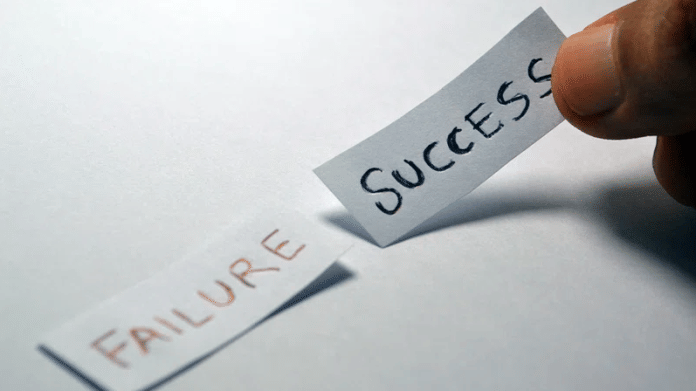New Delhi: Failure, popularly championed as a dutiful teacher, offers an education on the art of grit and determination, serving as a stepping stone to success. However, what if we’ve been overstating its efficacy?
Researchers from Northwestern University in a paper titled “The Exaggerated Benefits of Failure” and published in the Journal of Experimental Psychology on 10 June concluded that we do not learn from failure as rapidly as we think.
While labouring to assemble the incandescent electric lightbulb, the American inventor, Thomas Alva Edison, had reportedly said, “I have not failed. I’ve just found 10,000 ways that won’t work.”
It was precisely such feats of resilience in response to setbacks that Northwestern University’s Assistant Professor, Eskreis-Winkler and her team comprising Kaitlin Woolley, Eda Erensoy, and Minhee Kim had set out to investigate. They found that while Edison’s undying optimism served him well, this may not be the case for all of us.
“Across 11 studies, people in the lab and professionals in the field overestimate the rate at which health failures, professional failures, educational failures, and failures in a real-time task were followed by success,” wrote the authors of the paper.
They defined failure as “not achieving a desired goal” and constituted success as a “corrective action that achieves the previously failed goal or makes progress towards it”.
They propound that owing to the optimism bias – a tendency to overrate the likelihood of positive outcomes — people tend to “overestimate the likelihood of resilience following failure”.
Failing to fathom failure
The first two of 11 studies the researchers conducted delved into the human tendency to overrate success following disappointments at school and work. Standardized tests were chosen as the source of real-world data with which post-failure success rate predictions of online participants were compared.
The study uncovered that only 35 percent of lawyers, 43 percent of nurses, and 58 percent of teachers, pass professional exams upon retest.
However, participants in the study had expected these numbers to be higher, predicting that 58 percent of lawyers, 63 percent of nurses, and 67 percent of teachers successfully pass retests.
They also underestimated the probability that students would continue to fail the General Education Diploma (GED) — a test taken to attain a high school diploma in the US and Canada — on subsequent attempts.
In the third and fourth studies, the scholars sought to determine whether omitting the mention of failure influenced the participants’ predictions of post-failure success.
They discovered that participants were more accurate about test-takers passing a teacher licensing exam when they were unaware that they had failed in an earlier attempt.
They attributed this tendency to overestimate the rate at which success follows from failure to a predilection to inflate how much attention we pay to our failures and learn from them once they have occurred – a factor that they termed as “an attention to failure gap”. Such overestimations of post-failure success hinder individuals from lending a helping hand to those who could benefit from assistance following a setback.
In their final two studies, the researchers analysed ways to battle the potentiality of the harmful tendency to exaggerate the post-failure success rate. They found that by making participants in the study aware of the lower-than-expected rate at which people succeed at a task following failure, participants were able to correct the overestimation.
Power of successful description of failure
These results can inspire beneficial policy changes, making this research particularly striking.
“People who overestimate the likelihood of follow-up success may see less need for programs and policies that scaffold growth among people who are struggling and need help, like, people with addiction and people with criminal convictions”, Eskreis-Winkler and her team wrote in the paper, resulting in the underfunding of those “policies and programs designed to help struggling individuals with learning and growing from past mistakes”.
Correcting these success overestimations, therefore, becomes pivotal.
The team sounded a warning as well: Success overestimates can cause people to over-challenge each other and even themselves resulting in “compromised outcomes in workplaces, relationships, and beyond”.
Granville D. Austin is an intern with ThePrint







I liked the rticle very much and thanks to the writer and the Print.Very interesting information and knowledge provoking time.
“I have not failed. I’ve just found 10,000 ways that won’t work.”
Thomas Alva Edison, had reportedly said It might work in those days, as just encourage all others who lose hope not to attempt. . No technology or device assistance, but still great.
But recently, the world record at Paris for the 2024 javelin thrower within the third attempt, though the first two failed to meet the target due to some other reason and were not related to his skills in the javelin throw. While, after crossing marginally the bar, his hands were to brush against his bar but it fell down. in those two cases, he realized immediately and corrected himself. He took less time in detecting the faults. due to all new technology and devices suitable.